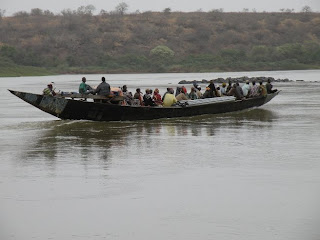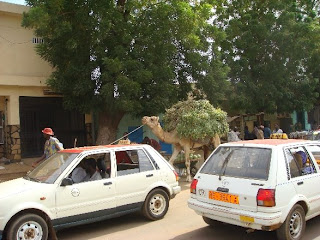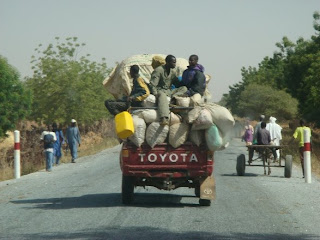(Note that all photos shown here are a form of taxi!)
Taxis usually come in two forms: car or motorcycle,

but could be a van or truck if you’re going into the bush or even a long canoe! Here in Niamey, taxis are cars. If you go to big port city of Cotonou, Benin, the best way to get weave through the congested streets is by "Zim" or motorcycle.
Taxis come in many states of repair or disrepair. Door handles that only work from the outside, modified door handles made out of clothes hangers, holey seats with the foam poking through, the metal skeleton of the vehicle showing, shattered windshields held together with packing tape, windows that don’t open completely or close….
The average taxi serves multiple clients at the same time (like a private run bus). “Just squeeze in. There’s always room for one more!” Babies and small kids can go on their mother’s lap or maybe even on your lap. “Hello there. What’s your name?”
Don’t expect private door to door service unless you have a hotel taxi or want to pay quadruple the price of a regular fair x two! Expect to share your taxi with at least 3 or 4 or more others.
Taxis also serve many unusual and everyday purposes! Commuting to work, going to the market, carrying your groceries home from the market, moving house, moving construction materials or agricultural supplies.
The trunk of a taxi is very versatile. It can hold anything and everything: freshly caught, fish, 50 kg bags of rice/corn/millet/potatoes/onions, pots and pans, precariously placed bowls/buckets of fermented porridge, open baskets of fragile tomatoes, small furniture, bags of manure for the garden, live chickens or goats with their feet tied, or entire legs/thighs of freshly butchered beef piled so high the trunk must be strapped down!

Some items just don’t fit in the trunk. Construction materials such as metal or wood poles may have to lay the length of the taxi and stick out of the window next to you. Once we were in a taxi where the driver hauled two HUGE truck tires on to the roof of the little old taxi. We were seriously concerned the roof would cave in on us!
Normally the taxi driver drops people off in a logical order (first come first served or whoever’s stop comes first on the way). Be prepared though to make a few detours which may bring you far away from your destination or lead you through bumpy side streets, narrow alleys and garbage dumps. The taxi driver decides where he will go and when. He may need to buy some gas along the way, or get a drink, or do a personal errand, or stop to make change for the 2000 CFA bill (worth about $5) you gave him.
Getting around town by taxi is pretty inexpensive. One average distance fare costs 200 CFA (about 50 cents). Carry plenty of little change in your purse. Don’t expect the driver to have much change for any bills no matter how small the denomination unless you happen to catch a taxi near the end of the day!

Taxi drivers are generally polite and very friendly. If they stop to buy a bottle of water, they usually buy extra and offer their passengers a bottle too. They open the door for you if you have a heavy load. Sometimes they are considerate to pull over well off the road so that you don’t have to get out into busy traffic. Generally, though, when you tell them to stop, they put on the brakes immediately. No warning to the cars behind. No gradually slowing down. No pulling over to the curb. No pulling over at a more convenient and safe location. Lesson: give the driver ample warning regarding where and when you want to get off.
Taxi etiquette: always greet the driver and EACH of the passengers when you get in. Failure to do so is very rude. Several times, I (Christine) have been reprimanded by ladies who have felt snubbed because I failed to greet them properly. Africans are very social people. They find Westerners rather antisocial in comparison. For instance, they can’t understand how Westerners can walk along a busy street without even greeting a soul or making eye contact. There will be times when the taxi driver wants to listen to radio or the other passengers are equally as tired as you, but generally it’s polite to carry on a small conversation throughout your drive. It always impresses people too if you can greet them or carry on a small conversation in one of the local languages. When it’s your stop, wave a friendly goodbye…
“Fofo. Kala han fo.” (Thank you. See you another time.)









